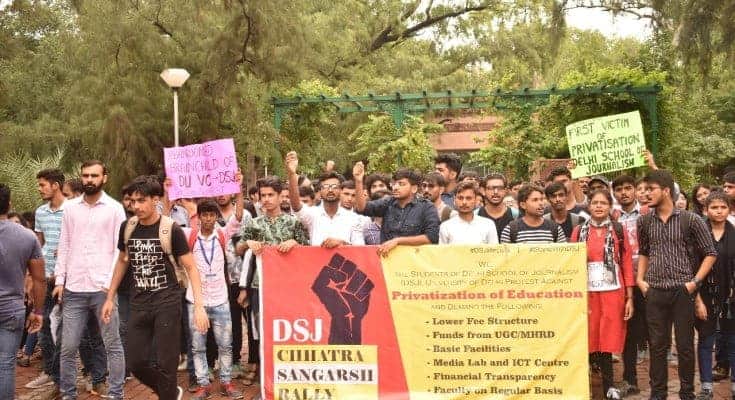Delhi University Teachers, raise objection against the Institute of Eminence(IoE) proposal, for proposing to recruit foreign faculty at competitive salaries, for undergraduate and postgraduate courses.
Objections have been raised by Teachers along with Delhi University Teachers’ Association (DUTA), against the Institute of Eminence (IoE) proposal, as the Varsity has proposed to recruit foreign faculty on “competitive salaries” with the existing faculty. Members of the Executive Council (EC) raised the issue recently after receiving the proposal for the same.
Abha Dev Habib, Office Bearer, DUTA told DU Beat, “As per the UGC Regulations on Graded Autonomy it has became clear that the differential pay needed to maintain foreign faculty will have to be generated by the institutions. This means that in order to run such programmes or centers, the fees will be enhanced sharply. Also differential pay for the same work is discrimatory. This will demoralise our own researchers and teachers. We also fear that in order to maintain rating and ranking, institutions may be forced to hire foreign faculty even in the disciplines/ areas where experts are available amongst our own people. With a large number of researchers and teachers waiting in queue for permanent jobs, this replacement will not be welcomed. This was also one of the major concerns put forth in the report by the Rajya Sabha Parliamentary Standing Committee against the Foreign Education Providers Bill, 2013.”
Delhi University was awarded the IoE in September 2019, by the Ministry of Human Resource Development (MHRD), thus making it eligible for a Government grant of INR 1000 crore. Teachers objected to the proposal, stating the possible encouragement of privatisation and contractualisatijon of employees. This new issue comes in the background of an existing protest by DUTA, who have been demanding absorption of ad hocs since the previous two months.
EC member Rajesh Jha said to Hindustan Times, “The administration says that IOE has been brought in to improve rankings of the Varsity. Why not work on the lopsided existing teacher-student ratio to improve that? There is no mention of absorbing teachers who have been working for years or even that of promotions and appointments.”
Rajib Ray, President, Delhi University’s Teachers’ Association (DUTA), said to Hindustan Times,“The proposal, if followed, will create an arbitrary pay structure, push for contractualisatijon, and create space for favouritism. Indian teachers are excelling in all fields and there is high unemployment in our country. In such a scenario, why would we want faculty members from other countries when we have enough qualified teachers?”
He added, “The entire proposal was submitted without discussion and the approval of statutory bodies. It will change the existing structure and character of the University.”
The IoE grant to be used for foreign faculty does very little for the various departments and colleges of the University. The foreign faculty would be hired as per the market demand, and their salaries may differ, and will not even result to job creation for our own struggling teachers, in times of recession.
Feature Image Credits: Newslink
Anandi Sen





